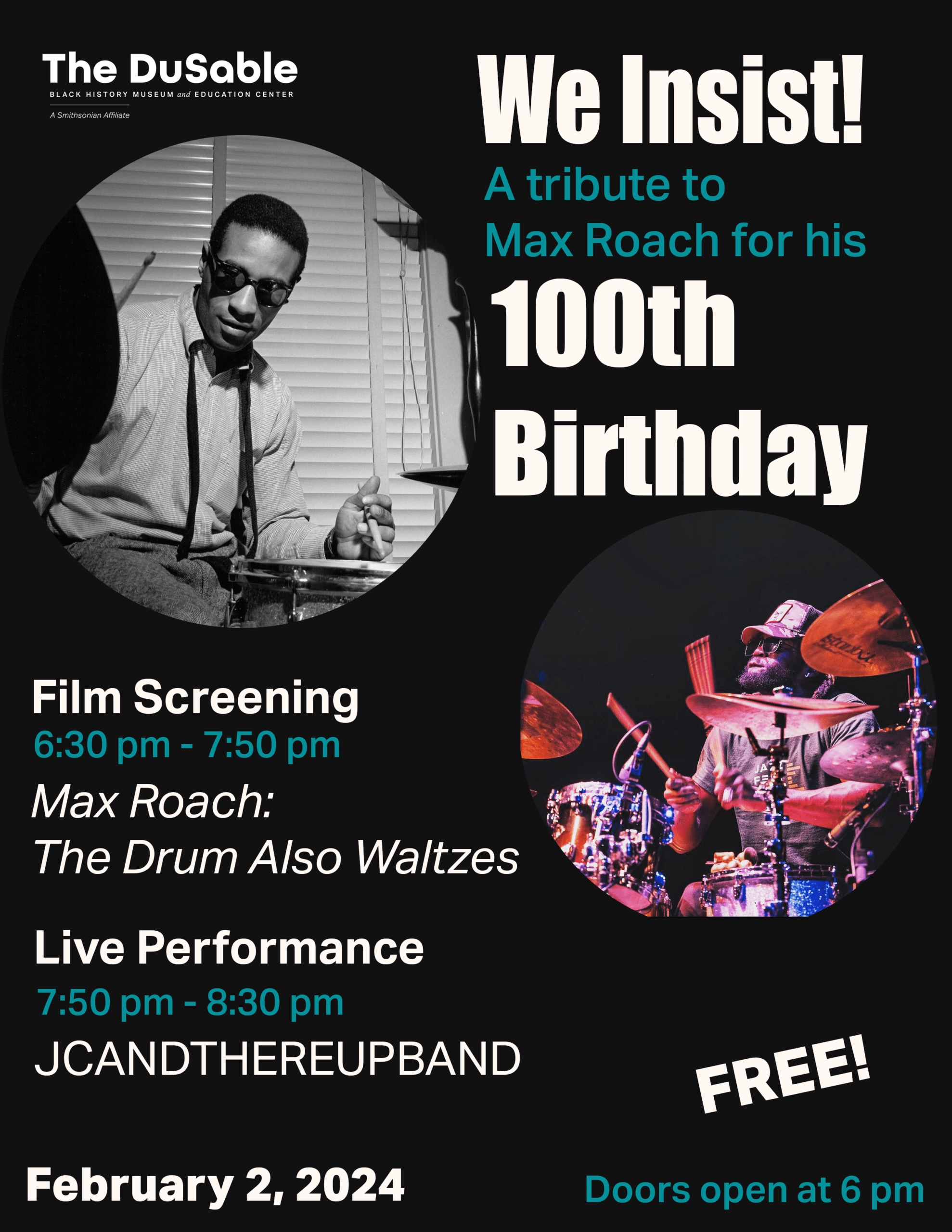
- This event has passed.
We Insist! A Tribute to Max Roach for his 100th Birthday – Film Screening and Live Music
February 2 @ 6:30 pm - 8:30 pm CST

We Insist! A Tribute to Max Roach for his 100th Birthday – Film Screening and Live Music
From the Hyde Park Herald:
Kicking off Black History Month in Hyde Park, The DuSable Black History Museum and Education Center is paying tribute to famed jazz drummer Max Roach with a night of music and celebrations on Friday.
The Feb. 2 event, “We Insist!”, celebrates what would have been Roach’s 100th birthday with a screening of the new documentary “Max Roach: The Drum Also Waltzes” and a performance by JCANDTHEREUPBAND. Fronted by jazz drummer Jeremiah Collier, the band will perform Roach’s seminal album from which the event takes its name.
“Roach was an activist, he was a jazz drummer and composer,” said Dr. Kim Dulaney, vice president of education and programs at the DuSable. “He’s back there with all the greats. When we think of Mingus and Gillespie and all of those people, you have to think of Max Roach.”
Roach is widely credited with revolutionizing jazz as a genre and redefining the role of percussion in modern American music. Born Jan. 10, 1924, in Newland, North Carolina, Roach moved with his family to Brooklyn when he was 4. There, he began drumming at the age of 10 in his mother’s gospel ensemble, according to The National Endowment for the Arts. Fresh out of high school, he took a job of house drummer at Monroe’s Uptown House in Harlem, where he rubbed shoulders with jazz giants like Charlie Parker, Dizzy Gillespie and Thelonious Monk.
Throughout his career, Roach and his contemporaries would usher in the bebop age of jazz, a style defined by instrumental complexity, a fast tempo and quick changes of key.
In 1954, Roach formed a quintet with trumpeter Clifford Brown, pianist Richie Powell, and saxophonists Harold Land and Sonny Rollins. The group performed together on the track “I’ll Remember April” on their 1956 “Clifford Brown and Max Roach at Basin Street” album. The song would gain notoriety for its blend of Latin percussion and swing styles. Roach would later remark that this new sound was heavily influenced by his Brooklyn upbringing, where he would listen to his Caribbean neighbors mix a wide range of musical textures, according to the Percussive Arts Society. Similar recordings at the time featured a Latin section played on the kit’s ride cymbal. Roach moved the grounding rhythm from the ride to the tom-toms, creating a deeper, more relaxed timbre.
Roach was also known for his deep commitment to blending music and political commentary. His 1960 album, “We Insist! Max Roach’s Freedom Now Suite,” responded to the major civil right’s issues of the time, such as segregation in the U.S. and South African apartheid. Abbey Lincoln, Roach’s then-wife, performs vocals on the album and was an accomplished jazz performer in her own right.
That same year, Roach and bassist Charles Mingus protested the Newport Jazz Festival by hosting their own rival festival nearby. The pair was frustrated that the festival’s lineup heavily featured white performers playing mainstream jazz compositions rather than Black musicians who were innovating the genre.
“In the African American community, there’s this long history of artists being the activists because they were, at times, the only voice that could speak for people of African descent in America,” said Dulaney. “Max Roach said himself that his music, always, always, always was in step with the movement. Always. That’s what he felt himself. He never thought it was just music for music’s sake, it was always to say something, or to try to get something done.”
Among Roach’s other major musical contributions was pioneering the solo percussion album with his 1966 work “Drums Unlimited.” At the time, solo percussionists were not selling out concert venues like pianists or orchestral ensembles. However, according to Rick Mattingly for the Percussive Arts Society, Roach felt the drums had more to contribute than simply keeping time.
Roach once compared composing drum solos to creating a physical space: “It isn’t about melody and harmony. It’s about periods and question marks. Think of it as constructing a building with sound. It’s architecture.” Wanting to center percussion in the musical conversation, Roach founded M’Boom in 1970. The experimental jazz percussion ensemble flirted with a multicultural sound by combining kit drumming with marimbas, timpani and gongs, among other instruments.
In his later years, Roach would go on to compose music featuring the musical stylings of jazz musicians like Cecil Taylor and Chicago’s own Anthony Braxton. A scholar of the percussion traditions of other cultures, he also composed for the Japanese taiko group Kodo. Following a career that redefined how the drums could be played, Roach received a MacArthur Fellowship in 1988, the first ever awarded to a jazz musician.
Roach died in August 2007 after complications related to Alzheimer’s disease. His daughter, Maxine Roach, carried on the family’s musical legacy as a classically trained violinist. Her work can be heard in films such as the 1989 Spike Lee classic “Do the Right Thing” and the 2019 documentary “A Beautiful Day in the Neighborhood.”
“Oftentimes, our geniuses are misunderstood,” said Dulaney. “People wanted them to do whatever was popular at the time, whatever they had made popular. They want them to stay in that bag.”
But artists like Roach, Dulaney continued, wanted to “always go deeper. He was always attempting to do something new, to do something creative, and to do something meaningful.”